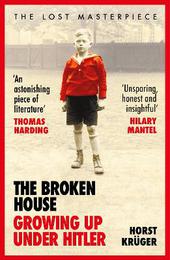
|
The Broken House: Growing up Under Hitler - The Lost Masterpiece
Paperback / softback
Main Details
| Title |
The Broken House: Growing up Under Hitler - The Lost Masterpiece
|
| Authors and Contributors |
By (author) Horst Kruger
|
|
Translated by Shaun Whiteside
|
| Physical Properties |
| Format:Paperback / softback | | Pages:208 | | Dimensions(mm): Height 199,Width 130 |
|
| Category/Genre | Memoirs
Revolutions, uprisings and rebellions
The Holocaust
Second world war |
|---|
| ISBN/Barcode |
9781529113198
|
| Classifications | Dewey:943.086092 |
|---|
| Audience | | General | | Tertiary Education (US: College) | | Professional & Vocational | |
|---|
|
Publishing Details |
| Publisher |
Vintage Publishing
|
| Imprint |
Vintage
|
| Publication Date |
16 June 2022 |
| Publication Country |
United Kingdom
|
Description
The major rediscovery of a forgotten masterpiece in the mould of Alone in Berlin and Stoner - the literary memoir of a youth in Nazi Germany. 'Exquisitely written... haunting... Few books, I think, capture so well the sense of a life broken for ever by trauma and guilt' - Sunday Times 'An unsparing, honest and insightful memoir, that shows how private failure becomes national disaster' - Hilary Mantel In 1965 the German journalist Horst Kr ger attended the Auschwitz trial in Frankfurt, where 22 former camp guards were put on trial for the systematic murder of over 1 million men, women and children. Twenty years after the end of the war, this was the first time that the German people were confronted with the horrific details of the Holocaust executed by 'ordinary men' still living in their midst. The trial sent Kr ger back to his childhood in the 1930s, in an attempt to understand 'how it really was, that incomprehensible time'. He had grown up in a Berlin suburb, among a community of decent, lower-middle-class homeowners. This was not the world of torch-lit processions and endless ranks of marching SA men. Here, people lived ordinary, non-political lives, believed in God and obeyed the law, but were gradually seduced and intoxicated by the promises of Nazism. He had been, Kr ger realised, 'the typical child of innocuous Germans who were never Nazis, and without whom the Nazis would never have been able to do their work'. This world of respectability, order and duty began to crumble when tragedy struck. Kr ger's older sister decided to take her own life, leaving the parents struggling to come to terms with the inexplicable. The author's teenage rebellion, his desire to escape the stifling conformity of family life, made him join an anti-Nazi resistance group. He narrowly escaped imprisonment only to be sent to war as Hitler embarked on the conquest of Europe. Step by step, a family that had fallen under the spell of Nazism was being destroyed by it. Written in accomplished prose of lingering beauty, The Broken House is a moving coming-of-age story that provides an unforgettable portrait of life under the Nazis. Yet the book's themes also chime with our own times - how the promise of an 'era of greatness' by a populist leader intoxicates an entire nation, how thin is the veneer of civilisation, and what makes one person a collaborator and another a resister.
Author Biography
Horst Kr ger (1919-99) was a German journalist, novelist and travel writer. Published in 1966, The Broken House was critically acclaimed as an exemplary portrait of youth in Nazi Germany.
ReviewsExquisitely written... haunting... Few books, I think, capture so well the sense of a life broken for ever by trauma and guilt -- Dominic Sandbrook * Sunday Times * A masterpiece. An astonishing piece of literature. Complex, heartfelt, vibrant, intense, urgent. A must read. I read it straight through to the last page and then wanted to read it all over again -- Thomas Harding, bestselling author of Hanns and Rudolf The major rediscovery of a forgotten treasure. No book has ever so honestly evoked the wretched terror of life in Nazi Germany -- James Hawes, author of The Shortest History of Germany I often think that the key to a successful memoir is to find the right place to stand, the effective distance. Writing in the sixties, Kruger had enough clarity to see where his story fitted into the big picture, but he can still make the reader feel the passion, danger and grief. It is an unsparing, honest and insightful memoir, that shows how private failure becomes national disaster. There is no mercy from the author and no false hope, but he fills a gap in the historical imagination -- Hilary Mantel A book of hard-won simplicity and quite beautiful precision * The Times *
|